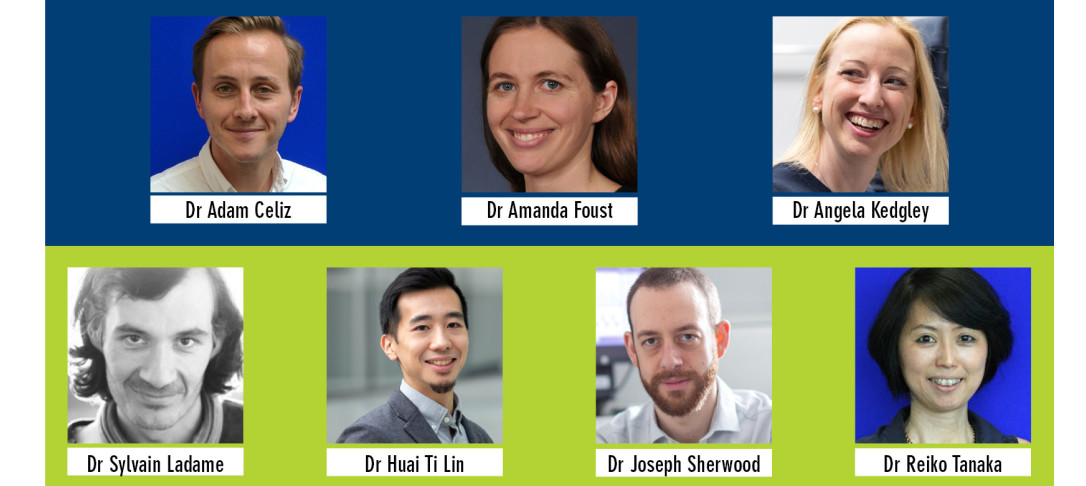
Catch up on this Bioengineering Department Seminar on our YouTube channel: Click here to watch
Speakers:
 DR ADAM CELIZ
DR ADAM CELIZ
Talk title: Regenerative Medicine and Biomaterials
Biography: Dr Adam Celiz gained his bachelor’s degree in Pharmaceutical and Chemical Sciences at the University of Brighton and a PhD in Chemistry at the University of Cambridge in the Melville Laboratory for Polymer Synthesis. Following this, he was awarded a Marie Curie International Outgoing Fellowship to perform postdoctoral research at the University of Nottingham and the Wyss Institute for Biologically Inspired Engineering at Harvard University. During this fellowship, Adam designed biomaterials that interact with tissues and stem cells to repair or regenerate tissues, specifically, “tough” surgical tissue adhesives and regenerative dental fillings. His research has been published in journals such as Science, Nature Materials and Advanced Materials.
Adam joined the Department of Bioengineering at Imperial College London in August 2017 as a Lecturer where he will be developing biomaterials for tissue repair and regeneration.
 DR AMANDA FOUST
DR AMANDA FOUST
Talk title: Light-field imaging for neuroscience: a microscope that sees electricity in 3D
Biography: Amanda J. Foust is a Royal Academy of Engineering Research Fellow and Lecturer in the Department of Bioengineering at Imperial College London. She obtained her BSc degree in neuroscience with an emphasis in computation and electrical engineering from Washington State University, and MPhil and PhD degrees in neuroscience from Yale University. The aim of her research program is to engineer bridges between cutting-edge optical technologies and neuroscientists to acquire new, groundbreaking data on how brain circuits wire, process, and store information.

DR ANGELA KEDGLEY
Talk title: To be confirmed
Biography: Dr Angela Kedgley is a Senior Lecturer in Orthopaedic Biomechanics the Department of Bioengineering. Her research interests broadly encompass the mechanics of joint motion in the human body and take an inter-disciplinary approach to develop a new understanding of how we can more effectively diagnose and treat joint pathologies.
Her most recent work is focussed on the hand and wrist and is being conducted in collaboration with orthopaedic surgeons and hand therapists at Chelsea Westminster, Charing Cross, and St Mary’s Hospitals.

DR SYLVAIN LADAME
Talk title: Engineering platform technologies for sensing nucleic acid biomarkers in bodily fluids: applications to early diagnosis and longitudinal monitoring of cancers and early prediction of preterm birth
Biography: Sylvain Ladame (FRSC) is a reader in the Department of Bioengineering at Imperial College London. Trained as an Organic Chemist in France, he then did a 5-year postdoc at Cambridge University in the group of Prof. Shankar Balasubramanian (2001-2006) before starting his independent academic career in Strasbourg (France) within the Institute of Science and Supramolecular Engineering (2006-2010) as a CNRS group leader.
Since joining Imperial College London in 2010, Dr Ladame has specialised in the development of nucleic acid sensors with applications ranging from diagnosis and longitudinal monitoring of hormonal cancers to early prediction of preterm birth.

DR HUAI-TI LIN
Talk title: Neuromechanics & Bio-inspired Technologies
Biography: Dr Huai-Ti Lin joined the department in May 2017 as a Lecturer. Prior to this, Dr Lin received his first degree in physics and biology at the University of Massachusettes Amherst. He then obtained his PhD from Tufts University in the areas of biomechanics and bio-inspired robotics.
Huai-Ti devoted many years to postdoctoral training in animal flight research at Harvard University and systems neuroscience at Howard Hughes Medical Institute Janelia Research Campus. He is particularly interested in how animals move and how they guide their movements and this has led him to study locomotion, neurobiology, bio-inspired robotics, and animal flight. In the past few years, Huai-Ti has been refining techniques to enable insect scale motion capture using the dragonfly as a model system. This will allow him to interrogate insect behaviours using robots in closed-loop. He has also been pushing the application of ultra-light wireless neural recording system which will be the centrepiece of his lab in the Department of Bioengineering.

DR JOSEPH SHERWOOD
Talk title: JAMVENT: a supply chain agnostic ventilator
Biography: Joseph Sherwood is a Research Fellow in the Department of Bioengineering at Imperial College London. He has an MEng in Mechanical Engineering from King’s College London and a PhD in Biofluid Dynamics from University College London.
Joseph’s research covers multiple aspects of biofluid dynamics, with a particular focus on flows of biological fluids in small places and how they are altered by disease. This includes blood flow in microvessels in diabetes and aqueous humour flow in glaucoma. Since the COVID-19 pandemic, Joseph’s focus has been the development of a low-cost, high-performance ventilator to help address the global shortage.
Joseph has been working in the Department of Bioengineering for 8 years and teaches Biofluids in the Biomechanics course for 3rd year MEng and MSc students.

DR REIKO TANAKA
Talk title: Computational systems biology and medicine
Biography: Dr Reiko Tanaka obtained her PhD from the Department of Mathematical Engineering and Information Physics, the University of Tokyo and afterwards, was appointed as an Assistant Professor in the Department of Applied Physics and Physico-Informatics, Keio University. With her strong interest in the new area of systems biology, she obtained a fellowship from JSPS (Japan Society for the Promotion of Science) to join Professor John Doyle”s group in California Institute of Technology as a Visiting Associate. Since then she has been working in the area of systems biology from the systems and control viewpoint. Before joining Imperial, she was a research scientist in the Biological Control Systems lab. in RIKEN.
With her special interest in regulatory mechanisms in biological systems combined with her background in engineering systems and control theory, Dr Tanaka aims to search for fundamental rules and mechanisms of biological control from the viewpoint of control and to make a decisive contribution to systems medicine and biology.